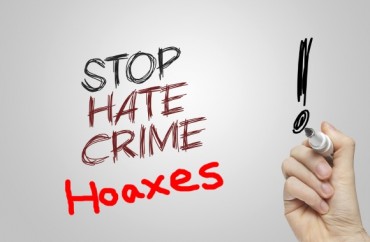
Two weeks before the Jussie Smollett case was revealed to be a hoax, The College Fix pretty much called it out as such. How did we know? Because we’ve seen it before. A lot.
For the past seven years, we’ve chronicled dozens of similar examples nationwide on college campuses or perpetrated by students. In sum, more than 50 and counting.
For starters, The College Fix tracked 9 campus hate-crime hoaxes between 2012 and 2014, as well as one that took place in 2011.
Examples included two black students at Montclair State University who reported finding hateful and threatening graffiti aimed at African Americans and women on their dorm room doors. One of the messages read, “Black B— you will die.” Police, however, discovered the students penned the graffiti themselves.
In 2013, there was the hate crime at Oberlin College that fell apart, an alleged “KKK figure” roaming the campus who turned out to be just “a person wrapped in a blanket.” Then it came to light that a series of racist, anti-Jewish and anti-gay messages found at Oberlin were the work of two Obama-supporting Leftists.
Then we reported on another 11 hate-crime hoaxes in 2015. That year, examples included a Muslim student who claimed she was stalked and threatened by a guy with a gun. She made the entire thing up.
Also in 2015, University of Delaware students discovered three “nooses” near the hall where the Black Lives Matter group had protested conservative commentator Katie Pavlich the day before. Except the objects weren’t nooses; after an investigation, they were determined to be “remnants of paper lanterns” leftover from a previous event.
Not to be outdone, 2016 was a busy year.
The most famous example comes from the trio of SUNY-Albany students caught fabricating a racial hate crime. They had alleged they were the targets of racial slurs and then were attacked by a group of white men on a bus — but video evidence and 911 audio showed the women were the instigators. (Nevertheless, activists defended them, because … racism).
Another infamous example from 2016 took place near the University of Iowa. A black student claimed he was beat up at a bar, prompting massive campus outrage. But police later determined the alleged victim was actually “an active participant and even an instigator.”
Moreover, at Clemson University that year, administrators let white students be tarred and feathered for hate-crime they knew was hoax. The incident has been dubbed “bananagate.”
And thanks to the election of President Donald Trump, they kept coming.
At Elon University, a scribbled “Bye Bye Latinos Hasta La Vista” after the election turned out to be written by … wait for it … a Latino student. Two more Trump-inspired hate-crime hoaxes popped up at Williams College and Bowling Green State University that month as well. Several other colleges faced similar false tales of woe.
Over at San Diego State, a Muslim student wearing a hijab claimed that a day after the election, two men approached her in a parking garage, pushed and verbally berated her, and stole her car. Campus police investigated the matter, including reviewing surveillance video, then later announced her claim that her car was stolen was unfounded. The police also suspended the investigation after the “victim” stopped cooperating with officers.
And in December 2016, a female Muslim Baruch College student who claimed she was assaulted on a New York subway train by “three drunk white men” shouting “Donald Trump!” was arrested herself — for making up the whole thing.
Meanwhile, 2017 proved to be another banner year for campus hate-crime hoaxes. The College Fix chronicled 17 of them. That year there was the student who cried KKK — except it was a sheet over lab equipment. Then there was the “Report Illegal Aliens; America is a White Nation” posters hung — by liberal students.
What’s more, 2017 also saw a black Air Force Academy cadet admitting to writing “Go home ni**er” on black students’ dorm room doors. And at St. Olaf College, a racist note that prompted the campus to shut down was a hate-crime hoax too.
And in Kentucky that year, a black man did not face charges for filing a false police report about the n-word graffiti and threat he painted on his own car near Kansas State University, which before it had been exposed as a hoax had prompted uproar on the campus.
In January 2018, The College Fix determined the student responsible for racially charged graffiti found at the University of Maryland is black. Also that month, it came to light that the 11-year-old female Toronto grammar school student who claimed a man attempted to cut off her hijab while she was on her way to school was lying.
Last March, a threat on social media which had targeted African-American students at a Maryland high school was written by a black student.
In November, a racist note at Kansas State University turned out to be a hoax. In a statement on its Facebook page, the Kansas State Police Department wrote “Upon questioning, the person who reported the incident admitted to creating and posting the note to their own door.”
In December 2018 at Drake University, after protests and an “emotionally charged” meeting, officials concluded four of five racist notes discovered in residence halls were hoaxes perpetrated by the same student.
Also that month, a black student at Goucher College was charged with two counts of malicious destruction of property after investigators determined he was responsible for graffiti which targeted specific individuals — including himself.
MORE: The Jussie Smollett case sounds a lot like college race hoaxes
MORE: University sees massive drop in alleged hate crimes after installing 400 security cameras
Like The College Fix on Facebook / Follow us on Twitter







Please join the conversation about our stories on Facebook, Twitter, Instagram, Reddit, MeWe, Rumble, Gab, Minds and Gettr.